Sinusitis is the inflammation of your sinuses due to some allergen or bacteria entering your body.
In America alone, about 35 million people suffer from a sinus infection or sinusitis at least once a year.
Sinuses are empty air-filled spaces inside the skull, and it could be life-threatening, if not treated quickly.
Acute sinusitis may last for 2 to 4 weeks. The conventional treatment of sinus infection includes antibiotics, decongestants, and painkillers by such medicines can bring about various side effects. (1)
Using essential oils for sinus infections and allergies is a popular form of home remedies that you may try safely.
In this article, you’ll learn the efficacy and uses of essential oils for sinus infection; plus the causes, and symptoms of the condition.
RELATED: 20 Essential Oils for Cough, Sore Throat, and, Congestion
Best 13 Essential Oils for Sinus Infection, Stuffy Nose, and Headache Relief
Essential oils are volatile compounds from leaves, flowers, and fruits of certain plants. People also call them aromatic or ethereal oil, because they are the essence of individual plants.
Essential oils are rich in antimicrobial, fungicidal, antiviral, and anti-inflammatory properties.
No wonder people have been using them as antidotes to all kinds of ailments for centuries. (5)
Essential oils are a great alternative to over-the-counter medications in treating a sinus infection.
Let’s learn about some top essential oils and how to use them to heal sinusitis.
1. Tea Tree Oil
Tea tree essential oil is popular for curing fungal and bacterial infections. This herbal oil is distilled from the tea tree plant. It has a pale yellow color and mothball-like odor. (6)
The antiseptic and antibacterial components of tea tree oil are ideal for the cure of sinusitis, coughs, chest congestion, congested nose and cold and flu.
You can inhale its steam by adding a few drops of hot water or use it like a warm bath.
How to use tea tree essential oil for sinus infection:
- Dilute some tea tree oil with a little bit of carrier oil in the ratio 2:4. You can use either almond or coconut oil.
- Dab your finger in the oil solution and apply it beneath your nose. You can massage it into the sinuses too.
- Rub a few drops of the solution on your forehead to relieve a sinus headache.
- Repeat the process twice a day to loosen the congestion and avoid infection.
RELATED: 12 Incredible Health Benefits of Tea Tree Oil (Backed by Evidence)
2. Lavender Oil
Lavender oil is well known for a host of therapeutic properties. This favorite herbal oil comes from the evergreen foliage- Lavender, grown in Northern Africa.
This sweet-scented herbal oil is rich in anti-inflammatory, antifungal, antidepressant, antiseptic and antimicrobial properties.
These can efficiently clear the congested sinuses, relieve pain and fight off the infection.
You can inhale lavender oil to get rid of a sinus headache and clean the phlegm formed in your lungs. (7)
You can have a message with this oil, add it to your hot bath or use it as a hot compress. It will relieve you from coughs, nasal congestion, throat infection, and other forms of respiratory disorders.
Below you have a steam therapy with lavender essential oil to treat a sinus infection.
How to use lavender essential oil for stuffy nose and congestion:
- Pour two cups of boiling water into a bowl.
- Mix 7-8 drops of lavender oil with the water.
- Cover your head with a towel as your face stands directly above the hot steam from the bowl.
- Repeat the process twice a day to thin out the congestion and clear the airways.
- Alternatively, mix 10-15 drops of lavender oil with your bathing water and dip in for 15 minutes. It will relax your muscles and senses and help you breathe comfortably.
RELATED: 11 Health Benefits of Lavender Oil That You Should Know
3. Pine Oil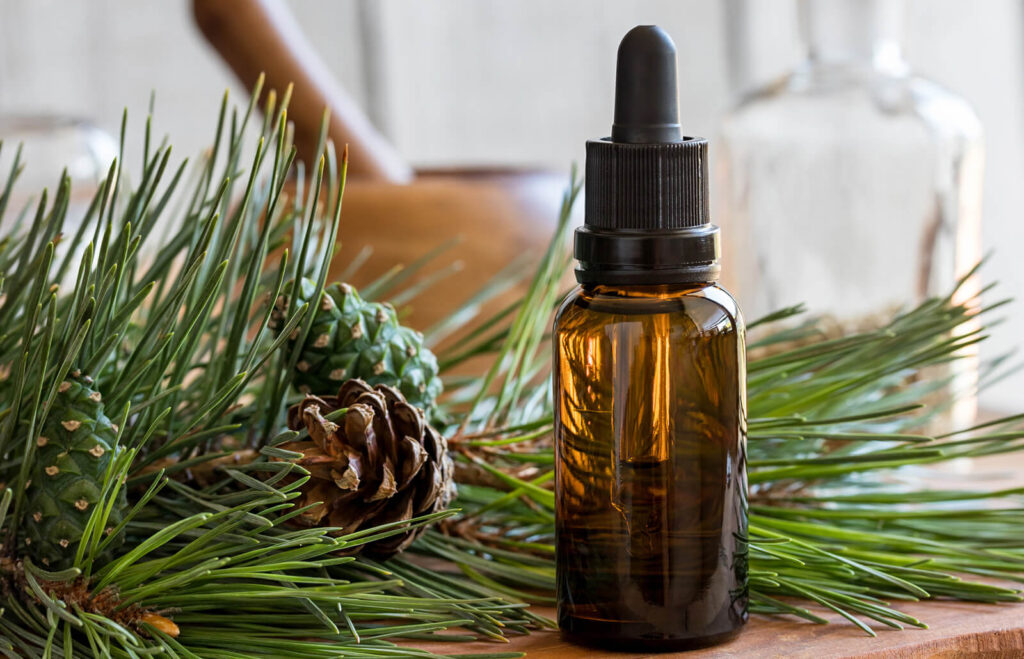
Pine essential oil comes from the steam distillation of the foliage of pine trees. It provides a wide range of health wellness.
The antibacterial and antiseptic properties inherent in this refreshing herbal oil help to relieve sinusitis.
Its potent decongestant effect resolves respiratory difficulties that come with a sinus infection. It’s a tonic for aches and pains as well.
How to use pine essential oil for sinus pressure:
- You can apply a few drops directly to your nasal passages and rub them on both sides of your nose
- It will help to unclog the mucus and phlegm of a sinus infection
4. Eucalyptus Oil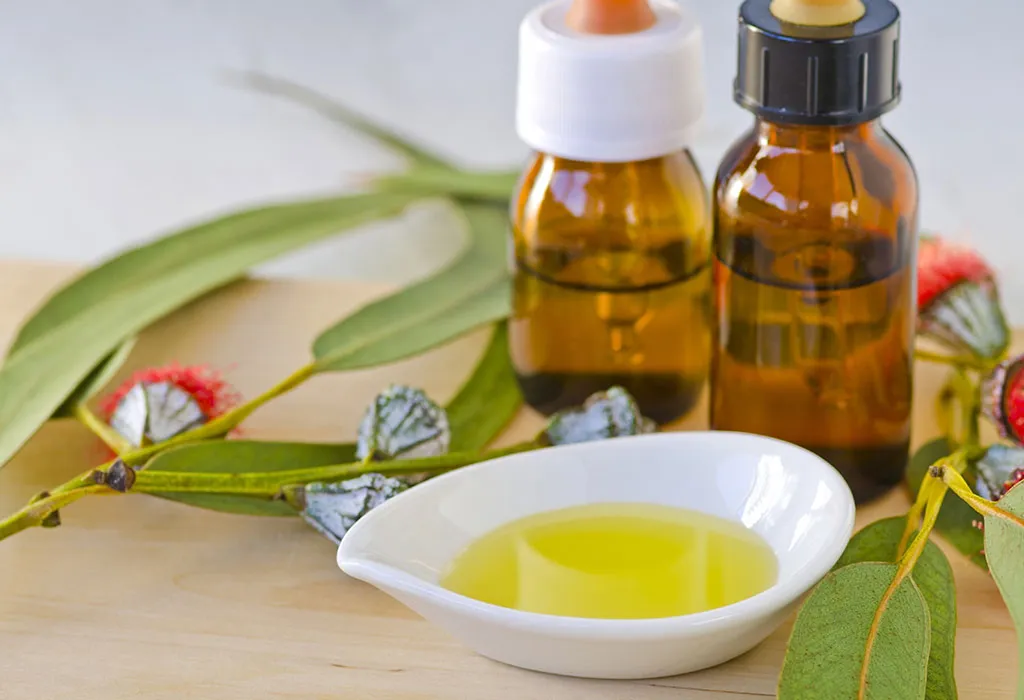
Eucalyptus essential oil has an extensive history of healing some respiratory and skin disorders in English history. Eucalyptus essential oil comes from the therapeutic eucalyptus plant or Tasmanian blue gum.
The leaves of the tree are steam-distilled to extract the highly potent medicinal oil.
The high expectorant value of eucalyptus oil is especially beneficial for relieving colds, flu, sinus infection, and other respiratory problems. The herbal oil has antimicrobial effects on the microorganisms that may cause flu and other infection in the body.
Let’s get to know how to use eucalyptus oil to treat sinus infections and congestion.
How to use eucalyptus essential oil for sinus congestion:
- Pour ten drops of the oil into a diffuser and diffuse the oil into your room environment all night to soothe sinus pressure.
- Alternatively, mix the oil with steamy hot water, cover your head with a towel and inhale the aroma deeply to ease sinus infections and cold.
5. Peppermint Oil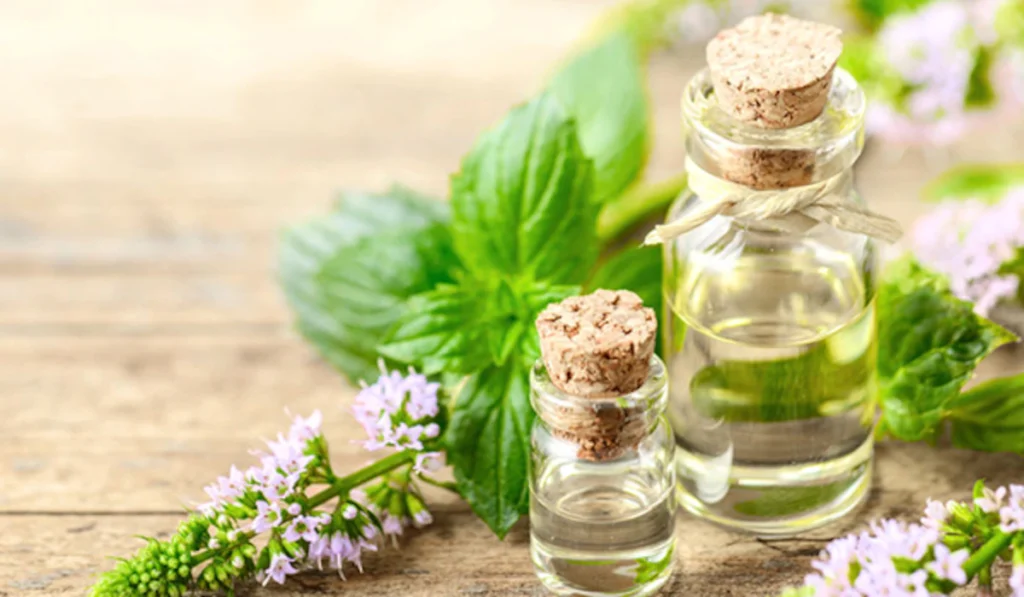
Peppermint oil comes from peppermint plants and is well known for its cooling menthol fragrance.
The organic compound menthol makes it the ideal decongestant for treating clogged-up airways, body pains, and coughs.
If you inhale it through a vaporizer, it helps to clear up the phlegm in your respiratory tract. The rosmarinic acid found in this herbal oil can also curb asthma and tuberculosis (8).
A peppermint steam therapy is the best way to deal with a sinus infection.
You should follow the directions given below.
How to use peppermint oil for sinus headache and infection:
- Put a few droplets of peppermint oil into some steaming hot water.
- Covering your head with a towel, breathe in the steam.
- Do this twice a day to remove congestion and promote draining.
RELATED: 12 Uses and Health Benefits of Peppermint Oil
6. Rosemary Oil
The sacred rosemary plant has a set of health benefits and culinary uses. The citrus fragrant rosemary essential oil comes from this celebrated lavender-like plant.
The study shows, that rosemary oil has all the essential therapeutic properties to treat sinusitis.
The antiseptic and antimicrobial properties of rosemary oil can ward off sinus infections (9).
How to use rosemary essential oil for sinus pressure:
- Blend four drops of rosemary oil with four drops of peppermint oil and make a solution
- Massage your temple and sinuses to relieve headaches and nasal congestion
RELATED: 13 Health Benefits and Uses of Rosemary Oil (Backed by Evidence)
7. Clove Oil
Clove is a fragrant spice mostly used in Indian and Chinese cuisine. Over the centuries clove has been a natural anesthetic to relieve toothaches and fight bad breath.
The evergreen clove tree gives us this heavenly clove oil.
This oil is a vital ingredient in aromatherapy because of its all-around health benefits. It has a versatile use in the pharmaceutical and skin care industry.
Clove bud oil has antiseptic, antifungal, antimicrobial, and aphrodisiac properties. This spicy and warming herbal oil is effective to relieve the congested sinuses and heal sinusitis. (10)
How to use clove essential oil to clear sinuses:
- You can use clove essential oil without diluting it.
- Take a few drops and rub directly on the sides of your nose and sinuses.
- Alternatively, you can add clove oil to a diffuser for treating a chronic sinus infection.
8. Oregano Oil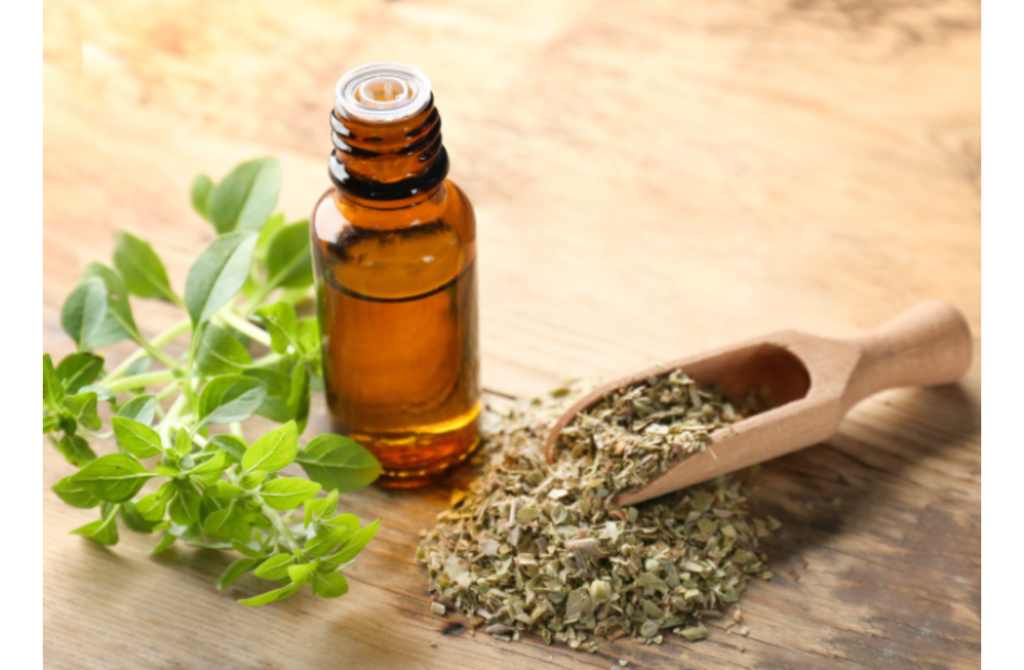
Oregano essential oil comes from dried wild oregano flowers and leaves. This therapeutic oil has a spicy aroma and golden color.
Carvacrol and thymol in oregano oil are two powerful anti-microbial properties to relieve sinusitis.
Massage and hot steam therapy are some popular methods to get the best out of this therapeutic oil for a sinus infection. (11)
How to use oregano oil for sinusitis:
- Add a little bit of oregano oil to some hot steamy water in a bowl.
- Cover your head with a towel and make sure to keep the steam inside.
- Make sure your eyes are closed shut as you breathe in this aromatic steam for a few minutes.
- Do this twice daily and clear your nasal passages and treat the infection.
9. Sweet Basil Oil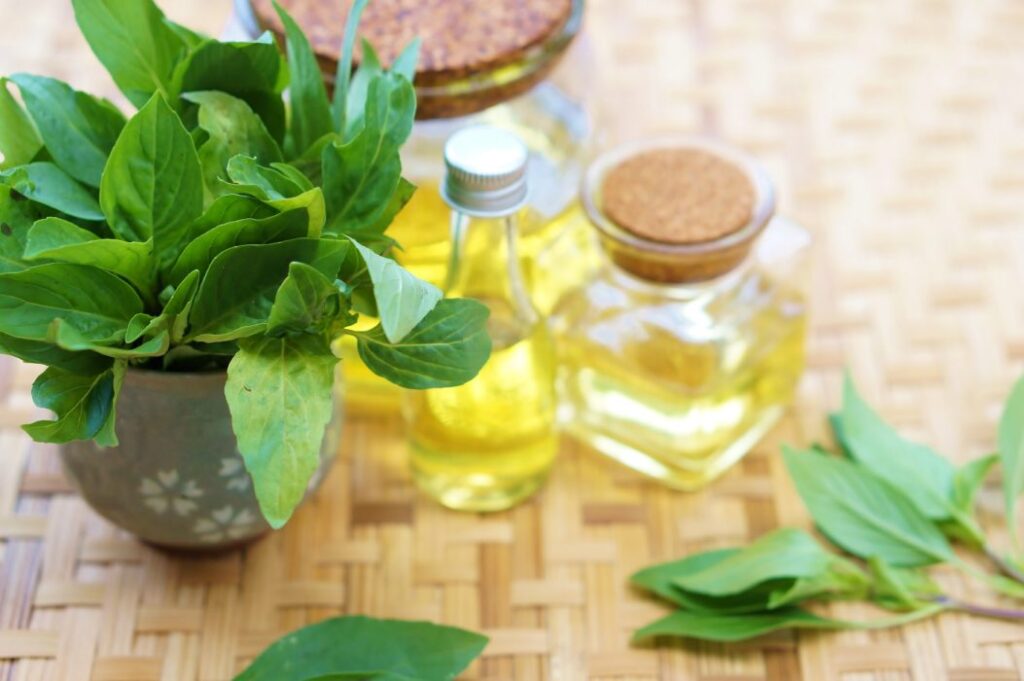
Basil is one of the common herbs in our kitchen garden. People use this herb for all sorts of home remedies. This foliage is responsible for producing our well-known herb, Basil leaves. (12)
This spicy and sweet-scented oil is enriched with antibiotic, analgesic, and anti-inflammatory properties.
It can clear congestion in your sinuses and ease your acute sinus headaches.
It also combats throat infection, fatigue, and body aches.
How to use sweet basil oil for sinus infection:
- You can add ten drops of basil essential oil to a vaporizer. You’ll feel relief from sinus congestion or headaches in less than 10 minutes.
- For quick relief from sinus pressure in your face, inhale this oil deeply from the bottle itself
RELATED: 10 No-Fail Home Remedies for Sinus Headaches & How to Use Them
10. Lemon Oil
Lemon is the storehouse of vitamin C, and people hail it as a cure-all fruit. Even the peel of the lemon is remarkable. Lemon essential oil originates from the evaporative oil glands of lemon peels.
The potent anti-inflammatory components of lemon oil ease coughs and sore throat. This citrus-scented herbal oil is full of antioxidants to cure swollen glands, pains, sinus infections, and respiratory difficulties. (14)
Home remedy for sinus infection using lemon oil:
- Rub a few drops of lemon essential oil on your nose and around your sinuses
- Inhale the oil deeply from the bottle to clear the clogged up nasal passages
- Mix 7-8 drops of lemon essential oil with steaming hot water to do a steam therapy
RELATED: 10 Ways Lemon Oil Can Benefit your Health
11. Geranium Oil
Geranium essential oil is a popular oil in aromatherapy for relieving some respiratory disorders. The aromatic oil comes from the stems and leaves of the geranium plants through the steam distillation process. The chief therapeutic components of the oil are alpha-pinene, menthone, linalool, myrcene, and so forth.
This complex composition of the herbal oil makes geranium oil a potent source of antimicrobial, anti-inflammatory, analgesic, and expectorant values.
Geranium oil can break down the accumulated phlegm in the respiratory tract and help you breathe easily during a sinus infection.
How to use geranium essential oil for nasal and chest congestion:
- Take a couple of drops of the oil and apply them on the nasal entrance on either side
- As you breathe, the oil will get absorbed and provide you with instant ease from the sinus pressure
- Alternatively, you can place a couple of drops of the oil on a fresh handkerchief and breathe in the aroma
- Repeat the treatment twice or thrice daily to get rid of a sinus infection
RELATED: 13 Easy Ways to Get Rid of Phlegm
12. Cedarwood Oil
Cedarwood essential oil is best known for treating the excessive amount of mucus produced due to sinus infection or inflammation.
The cedar wood tree is known for its antioxidant properties and research has shown that it also has pain-killing and antiseptic effects.
Cedarwood essential oil, extracted from the leaves of cedar wood, helps to fight against inflammation and bacteria in the respiratory system by loosening phlegm and mucus caused by the sinus.
Apart from its anti-inflammatory and anti-bacterial properties, this essential oil is also known for its antiviral, antifungal, antispasmodic, sedative, tonic, and diuretic properties as well that can be used daily to treat inflammation, congestion, and other respiratory issues.
How to use cedarwood essential oil for sinus infection and headaches:
- Take three two to three drops of cedarwood essential oil along with two to three drops of eucalyptus essential oil and rub into your chest as needed
- Breathing in the aroma of the oils will provide relief from coughing
- Alternatively, you could add this blend to your room diffuser
- Repeat the treatment twice or thrice a day to observe a drastic reduction in the duration of the symptoms caused by sinus
13. Thyme Oil
Thyme oil comes from the evergreen herb thyme belonging to the mint family. Its healing properties are anti-rheumatic, antibacterial, and calming components.
There are over 300 varieties of thyme-like herbs. Oil produced from each of them has different chemical properties and therapeutic benefits. Some may irritate your skin. (13)
Make sure to read the label before picking up your thyme oil. Oil from thyme linalool of France is the safest and most potent agent for sinus congestion.
Home remedy for sinus infection with thyme oil:
- Add a little bit of thyme essential oil to the hot water for ultimate steam therapy. It works like magic to dissolve sinus congestion and treat an infection.
- Massage and inhalation can help relieve the headaches and sinus pressure around your face.
Essential Oil Blend for Sinus Infection (Steam Therapy)
Combining some of the essential oils, you can make a powerful blend to beat sinusitis.
- Thyme essential oil two drops
- Peppermint essential oil three drops
- Rosemary essential oil three drops
Steps to follow:
- Boil water and pour it into a 5 cm deep bowl
- Add all the essential oils of the recipe to the steamy water and stir well
- Lean over it while draping a towel over your head and the bowl
- Close your eyes and breathe the steam in through your nose and mouth
- Keep inhaling as long as the water is hot and steamy
- You may reheat the water for another course.
How to Use Essential Oils for Sinus Infection and Congestion
Humidifier
A humidifier can add moisture to the air and help to clear your sinus congestion. Add 25-30 drops of your preferred essential oil into the humidifier before you go to sleep.
A moisture-filled air with anti-inflammatory properties can give you a speedy recovery from sinusitis.
Diffuser
An essential oil diffuser works very much like a humidifier. However, it is more portable and works best in a smaller area.
If you want to treat your sinusitis via diffuser; add 4-6 drops of your choicest essential oil with ½ cup of water into it. Turn on the diffuser and breathe in deeply for maximum relief.
Bath
Nothing can be more relaxing than an essential oil bath. It can give you a wholesome relief from clogged-up congestion, headaches, and fatigue that are associated with a sinus infection.
Add at least ten drops of your preferred essential oil to your hot bathing water. Soak yourself in it for 20 minutes to get rid of sinusitis.
Oral Consumption
The FDA has recommended only fennel essential oil for a limited consumption to treat sinusitis.
You can mix two drops of fennel oil with raw honey and consume the mixture for treating nasal congestion and infection.
Causes and Symptoms of Sinusitis
The following are the symptoms of a sinus infection: (3)
- Congestion of nose
- A runny and stuffy nose
- Loss of the sense of smell
- Yellow discharge from nose
- A persistent cold and cough
- Sinus headache
- Sinus pressure around your face and nose
- Fever and fatigue
The following are the causes of sinusitis: (4)
- A common cold
- Nasal Polyps or growths inside nasal cavities
- Narrow sinus drainage ducts
- Poor immune system
Bottom Line
Sinuses are empty air-filled spaces inside the skull. They have a channel to the nasal cavities with soft tissues and thin-lined mucus membranes.
People with a weak immune system have higher chances of developing bacterial or fungal sinus infections [1].
A common cold or allergy can infect you with bacteria or virus and clog your nasal passage with fluids. This, in turn, can lead to swelling of the mucous membranes and tissues in the sinuses. Thus, you can have a sinus infection. (2)
Peppermint, lemon, rosemary, and lavender essential oils are some highly recommended essential oils for treating a sinus infection and related symptoms.
READ NEXT: 13 Effective Ways to Get Rid of Cold That’ll Work





